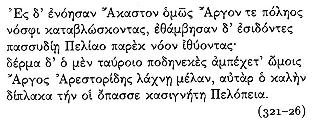B—
Appendix:
Argus and Acastus (224–27)
The appendix to the Catalogue, in which Apollonius adds the names of Acastus and Argus to the group, likewise does more than list names. As one will fully recognize only when the two
[24] The parents of the Argonauts could well be another factor in the thematic antithesis between the two halves. Of the twenty-seven Argonauts in the Orpheus half, only in five cases has Apollonius assigned gods as parents (Orpheus [Calliope]; Erytus, Echion, Æthalides [Hermes]; and Phleias [Dionysus]); and of the twenty-five of the Heracles half, the poet associates twelve with divine parentage (Heracles, Castor, and Pollux [Zeus]; Nauplius [indirectly], Euphemus, Erginus, and Ancæus [2] [Poseidon]; Idmon [Apollo]; Palæmonius [indirectly; Hephæstus]; Augeas [Helius]; Zetes and Calaïs [Boreas]). Moreover, in the first half, Apollonius could have made Orpheus the son of Apollo (cf. Sad 1.23–25a) and Polyphemus the son of Poseidon (cf. Sad 1.40–41), while in the second half, he could have made Idmon the son of Abas (cf. Argo. 2.815) and Augeas the son of Phorbas or Eleius (see Ardizzoni ad 172). It seems possible that the number (three versus six) and the nature of the divine parents who are associated with each half (Calliope, Hermes, and Dionysus, as compared with Zeus, Poseidon, Apollo, Hephæstus, Helius, and Boreas) are also factors that support both the structural and thematic distinction between the halves through the emphasis in the first on human parentage and gods associated with music, and the emphasis in the second on divine parentage and gods often associated with great strength.
heroes join the others at Pagasae (321–26), this addendum mirrors the heroic dichotomy between the man of skill and the man of strength seen in the Catalogue proper. A brief examination of the later passage will reveal that Acastus and Argus represent for Apollonius these two opposite types of hero. The lines in question run as follows:

They noticed Acastus and Argus coming down from the city
together, and they were amazed as they saw them
heading their way with all speed contrary to the will of Pelias.
Around his shoulders, Argus, the son of Arestor, wore a bull's hide
black with bristles and stretching to his feet; but Acastus wore
an elegant
double-folded cloak, which his sister, Pelopia, gave him.
The conspicuous difference in the attire of the newcomers is significant: Acastus is dressed in an elegant cloak made for him by his sister, while Argus wears a bull's hide. Their arrival immediately precedes the choice of the captain. During this election, Jason, a man who wears a cloak of intricate design, made and given to him by Athena (cf. 1.721ff.), vies against Heracles, a hero famous for his lion skin. To show how Acastus and Argus reflect the thematic antithesis of the two halves of the Catalogue proper, I must for the moment anticipate a point that I shall make at greater length in Chapter 4. Jason and Heracles each represent one of the two types of hero of the Catalogue: Heracles, besides playing an important role in establishing one of the heroic types in the list, is throughout the poem—as everywhere in Greek myth and legend—the consummate man of strength. But Jason, who wins the election upon the insistence of Heracles, believes that the success of the mission depends on the cooperation of the group. For him, it is the skill of a leader who knows how to take care of details and exercise diplomacy that is all-important (332–40). This
is in fact how he will proceed in the course of the expedition. Another instance of this sartorial distinction between the two different heroic types is found near the beginning of Book 2 in the boxing match between Polydeuces and Amycus. The former wears a cloak given to him by one of the Lemniades (


